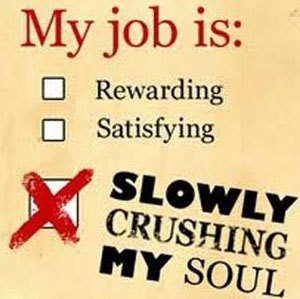Work Sucks!
“Oh, you hate your job? Why didn’t you say so? There’s a support group for that. It’s called EVERYBODY, and they meet at the bar.”
– Drew Carey, Comedian
It’s Friday! The joyous finish line of the work week, harbinger of weekend bliss when we can turn our broken backs on the toil and frustration and really live again for two days. Then the dreaded “Monday blues and Terrible Tuesday…” because “the negative mentality that ‘work sucks’ is embedded in our way of life,” According to Jacob Morgan, author and work futurist. “It’s all around us,” he says “and it needs to change” (2013).
This is because, with that mentality at work “…you lose the opportunity inherent in each moment for learning and excellence, and you start having that awful, downward-spiral, racing-to-catch-up-with-yourself feeling that leads to anxiety, impatience, bad decisions and ultimately ill health and burnout” in any job (Anderson, 2012).
We all can relate to that feeling. Over half of Americans believe their job sucks, according to an annual survey, and “many of us also conflate our self-worth with our career, unhelpfully, and our job unhappiness becomes life unhappiness, which raises the stakes,” said David G. Allen, Health and Wellness editorial director for CNN Digital and writer of the renowned Wisdom Project.
For over half of America our street-level wellness is directly under attack by the very thing that we at least derive income, if not meaning from; our own jobs. Of course, it’s our jobs—and our bosses—that need to change! Well, according to Morgan, Anderson and Allen, we are in control of our mentality, our focus and out “job happiness [which] can boil down to our innate desire for three things: control over our lives, positive daily connections, and joy and meaning in how we spend our waking time—half of which is at work, for most people” (Allen, 2016).
Working on Ourselves
“Life is 10% what happens to you and 90% how you react to it.”
– Chuck Swindoll, Pastor and Author
“Everything we know about work was built upon these mindsets and ideas that an employee is a cog, that work is drudgery, and that managers are slave drivers,” Morgan said, and this perspective is toxic. The
solution is “very basic. It stems from actually redefining and changing how we think about work and everything related to it. This change will come not just because we want it to, but because it has to” (2013).
This change in self-perspective is one of the three keys cited by Yale University psychologist Amy Wrzesniewski and University of Michigan professor of business administration and psychology Jane E. Dutton in a study they published in 2013 on cultivating positive meaning and identity in work. “The way to integrate our need for control, connection and meaning — while on the clock — is by ‘job crafting,’” they said. Which is “about ‘taking control of or reframing” some of the negative factors of our jobs, and/or our own negative perspectives on them. Just thinking differently about our job was found to increase how we like it, our fulfillment, our ability to handle stress and improve our performance (Allen, 2016).
Speaker Erika Anderson’s son—an entrepreneur, like herself, also coined a term which centers on building a positive work point of view; Momenteering. “It has taken an immediate place of honor in my lexicon” she said. “It points with complete accuracy to the meeting place of practical and spiritual; good business and good to yourself; inner and outer success” (2012). To be a momenteer is to be someone who is fully present, rapturously in-the-moment while on the job.
When we begin to see our jobs as valuable and important despite the difficulties we are more apt to become momenteers, in “in the flow state [when] some small part of your mind keeps you on track toward the goal, but the largest part of your attention is fully focused on doing whatever it is you’re doing right now…And it’s wonderful: joyful, rejuvenating, truly 3D. And this can happen at work” she declared. “I bet some of you have experienced it in your best moments.”
Working on Work
“If you wish to achieve worthwhile things in your personal and career life, you must become a worthwhile person in your own self-development.”
– Brian Tracy, Author and Speaker
 Sound exciting? It is. But without awareness, crafting your job and yourself, and a bit of practice, those moments are accidental and rare. “The latest numbers from research firm Gallup still show that around 70% of American workers are…sleepwalking through their work.” That “sleepwalking” is sometimes an attempt to just get through something we don’t like—we check out consciously or unconsciously because we feel unfulfilled or overwhelmed. “This is a scary and alarming statistic,” Morgan (2013) reported, since the power to change it is always in our hands, not just by quitting, but by changing our perspectives or crafting our jobs to stay more present in them.
Sound exciting? It is. But without awareness, crafting your job and yourself, and a bit of practice, those moments are accidental and rare. “The latest numbers from research firm Gallup still show that around 70% of American workers are…sleepwalking through their work.” That “sleepwalking” is sometimes an attempt to just get through something we don’t like—we check out consciously or unconsciously because we feel unfulfilled or overwhelmed. “This is a scary and alarming statistic,” Morgan (2013) reported, since the power to change it is always in our hands, not just by quitting, but by changing our perspectives or crafting our jobs to stay more present in them.
Being present in our jobs is vital to satisfaction since “when we are more present – less distracted…worrying about where we need to be next and whether or not we’ll get it all done, what people thought about what we just did…we’re more effective,” more fulfilled and feel more successful (Anderson, 2012). All it takes is waking up and putting in some renewed effort and it will bring renewed spirit quicker than we think.
“Wrzesniewski and Dutton’s research focused on three main factors of deeper workplace satisfaction that are within your sphere of influence:
- Refining your job to add parts you like and remove parts you don’t.
- Building better relationships with your colleagues.
- Reframing your job to add meaning and purpose” (Allen, 2016).
We’ve talked about number three a great deal because we must always first be honest with ourselves about our own need to change before we seek to change our environment, just in case the job dissatisfaction we feel is due to our own growing pains as professionals.
Number two, building better relationships, also goes hand-in-hand with momenteering when we seek out positive people to share our moments with. The hardest part of these relationships can be to talk about things other than work. It is always good to start with other shared interests. Or we can ask “so, what are you doing this weekend?” Based on the data it’s probably what our coworkers are already focused on.
 The number one of jobcrafting is as simple as going to the grocery store for the job you want. “Start by making three lists. One list is all the things you currently like about your job, big and small. The second lists all the hassles and headaches of your job, from the petty to the systemic. And the third lists things you’d like to be able to do in your job that you currently don’t — even if they have nothing to do with what you’re paid to do” (Allen, 2016).
The number one of jobcrafting is as simple as going to the grocery store for the job you want. “Start by making three lists. One list is all the things you currently like about your job, big and small. The second lists all the hassles and headaches of your job, from the petty to the systemic. And the third lists things you’d like to be able to do in your job that you currently don’t — even if they have nothing to do with what you’re paid to do” (Allen, 2016).
Once we’ve made our lists, the next step is to start actively crafting. Sometimes that means just bringing in flowers for our desks, if we love nature and beauty, or an iPod if we love to listen to music. Sometimes it involves conversations with our bosses or coworkers about improving how a task is completed so we can be more present in it. Sometimes it involves taking on something new, bringing more of ourselves to the table.
“When that happens, we’re momenteering,” Anderson (2012) declared. “It’s where world-class happens, and it’s beyond fun. And – this is the great part – it’s entirely within your control. Where you put your attention is up to you. It takes intention, discipline, and perhaps some training, but it really is something you can learn to do more and more regularly, regardless of your circumstance.”
This is the future of work according to Jacob Morgan (2013) and he has thousands of best-selling books to prove it. Workplace happiness is becoming the focus of administrators across the country. But we don’t have to wait for the bosses above us to catch the wave. We can be momenteers today, we can jobcraft now, and a rising tide will lift all our ships.
__________________________________________________
Allen, D. (2016) Fall in love with a job you don’t even like, in three steps. CNN, The Wisdom Project. Retrieved from: http://www.cnn.com/2016/09/05/health/love-job-you-hate-wisdom-project/index.html
Andersen, E. (2012) How to Make Work Really, Really Fun. Forbes. Retrieved from: http://www.forbes.com/sites/erikaandersen/2012/06/02/how-to-make-work-really-really-fun/#75beb9541559
Morgan, J. (2013) Why Does Work Suck?. Huffington Post. Retrieved from: http://www.huffingtonpost.com/jacob-morgan/why-does-work-suck_b_4178795.html



